When it comes to racket sports, pickleball and squash are both popular choices among players of all ages and skill levels.
While they share some similarities, there are distinct differences between the two games in terms of mechanics, rules, and fitness benefits.
In this comprehensive Pickleball vs Squash comparison, we will delve into the both worlds, exploring their game mechanics, court sizes, equipment requirements, and workout advantages.
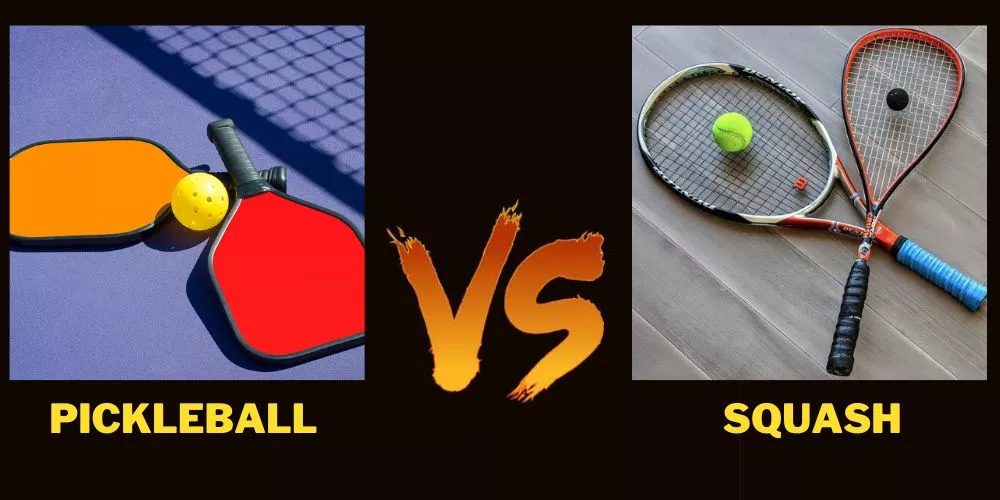
By the end, you will have a clear understanding of which sport aligns best with your preferences and fitness goals.
Pickleball vs Squash: Mechanics and Rules
Pickleball: Pickleball is played on a smaller court compared to squash, making it suitable for indoor and outdoor play.
The court dimensions are 20 feet wide and 44 feet long, with a net placed at 36 inches high at the sidelines and 34 inches at the center.
Pickleball uses specialized paddles made of wood or composite materials, along with plastic balls with unique hole patterns.
The game follows a simple scoring system, with points scored only by the serving team. The objective is to hit the ball over the net and keep it in play until the opposing team fails to return it properly.
Squash: Squash is traditionally an indoor sport played in a four-walled court. The court dimensions are larger compared to pickleball, measuring 21 feet wide and 32 feet long. Unlike pickleball, squash is played with rackets made of composite materials and a small rubber ball.
The scoring system in squash can be complex for beginners, with matches typically played as the best of three or five games.
The objective is to strategically hit the ball against the front wall, keeping the rally going until your opponent fails to return it properly.
Similarities between Pickleball and Squash
Despite their differences, pickleball and squash share some similarities:
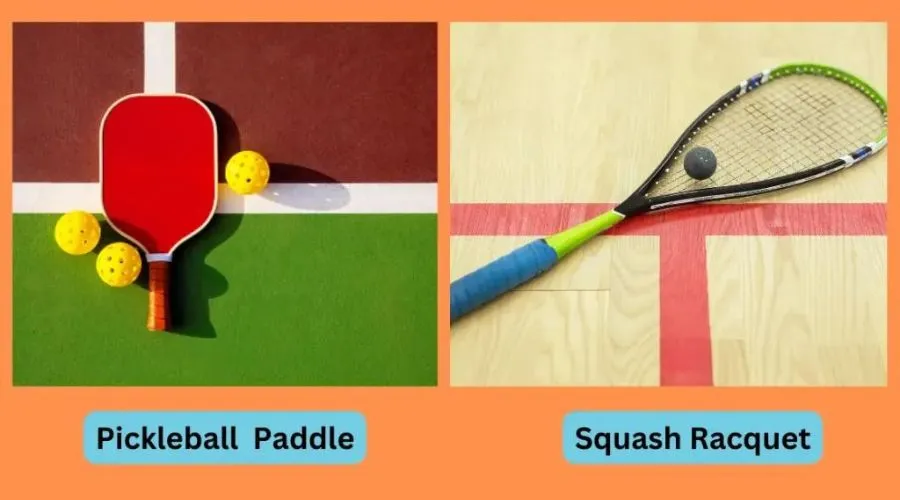
Racket Sports Classification:
Both pickleball and squash fall under the category of racket sports. This classification highlights the commonality of using specialized rackets as the primary means of gameplay.
Hand-eye Coordination and Reflexes:
Both games require strong hand-eye coordination and quick reflexes. Whether it’s a quick backhand return in pickleball or a swift volley in squash, players must react swiftly to keep the rally going.
Strategy and Shot Placement:
In both pickleball and squash, players must strategically place their shots to gain an advantage over their opponents. The ability to hit accurate shots and anticipate the opponent’s moves plays a crucial role in winning a point.
Physical Fitness Benefits:
Pickleball and squash offer excellent physical fitness benefits. Engaging in either sport can improve cardiovascular endurance, agility, balance, and hand-eye coordination.
Pickleball vs Squash: All The Key Differences Revealed
While there are similarities between pickleball and squash, there are notable differences that set them apart:
Court Size and Playing Area:
Pickleball courts are smaller than squash courts, making them more suitable for players looking for a less demanding physical experience or those with limited space.
Squash courts, being larger and more enclosed, require players to cover larger distances and utilize the available space more efficiently.
Equipment Differences: Paddles vs Rackets
Pickleball uses paddles that are larger and more lightweight compared to squash rackets. The larger surface area of pickleball paddles offers a larger sweet spot, making it relatively easier for beginners to hit the ball.
Squash rackets, on the other hand, provide more power and control but require more advanced technique and shot precision.
Gameplay Pace and Intensity:
Pickleball is typically played at a slower pace compared to squash. The larger court and relatively slower-moving ball in pickleball allow players more reaction time and make it a more accessible sport for players of all ages and fitness levels.
Squash, with its smaller court and faster-moving ball, demands greater speed, agility, and endurance.
Skill Requirements and Learning Curve:
Pickleball is generally considered easier to learn than squash due to its simpler rules and mechanics. The larger paddles and slower pace provide beginners with a more forgiving learning curve.
Squash, however, requires more advanced technique, shot accuracy, and court strategy, making it a game that requires time and practice to master.
Fitness and Workout Comparison
Both pickleball and squash offer numerous fitness benefits, but they differ in the intensity and specific aspects of fitness they target:
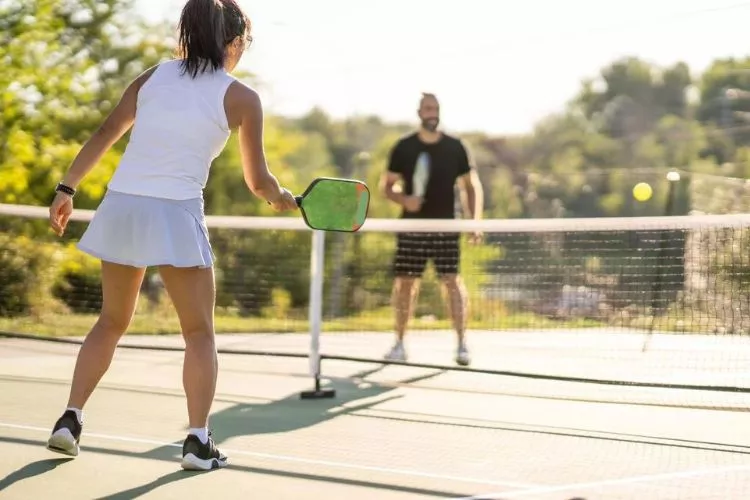
Cardiovascular Benefits:
Both sports provide excellent cardiovascular workouts. The continuous movement, short sprints, and quick changes of direction in pickleball and squash contribute to improved heart health and increased stamina.
Muscle Engagement and Toning:
Pickleball engages various muscle groups in the upper and lower body, including the arms, shoulders, core, and legs.
Squash, being a faster-paced sport, engages the same muscle groups as pickleball but can also provide an intense leg workout as players constantly move to cover the larger court.
Calorie Expenditure Comparison:
The average calorie expenditure in both sports varies depending on intensity, duration, and a player’s weight.
On average, pickleball can burn around 400-600 calories per hour, while squash has the potential to burn approximately 700-1000 calories per hour due to its higher intensity and increased movement.
Impact on Joint Health and Injury Risk:
Pickleball is considered a low-impact sport, as the slower-moving ball and larger court reduce the risk of joint injuries, making it more suitable for individuals with joint issues.
Squash, on the other hand, involves faster movements and frequent changes in direction, potentially placing more stress on the joints and increasing the risk of certain injuries, particularly for inexperienced or out-of-shape players.
Choosing the Right Sport for You
When deciding between pickleball and squash, it’s essential to consider various factors:
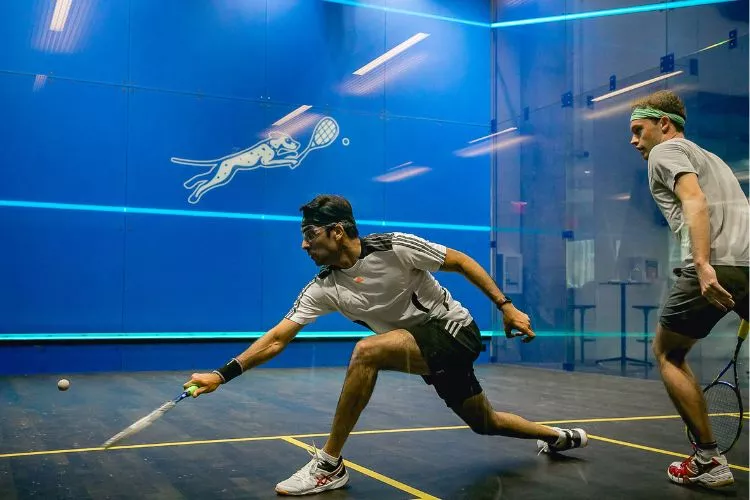
Skill Level and Experience:
Pickleball is generally more accessible to beginners due to its simpler mechanics and slower pace. Squash, with its faster and more challenging gameplay, may be better suited for experienced or athletic individuals.
Age and Physical Condition:
Pickleball’s slower pace and lower impact on joints make it more suitable for individuals of any age or those with joint issues. Squash, with its higher intensity and faster gameplay, may be more suitable for younger, more physically fit individuals.
Personal Preferences and Goals:
Consider your personal preferences for gameplay, court size, and equipment when choosing between pickleball and squash. Additionally, consider your goals, whether it’s improving fitness, learning a new skill, or joining a social community.
Availability of Courts and Players:
Check the availability of pickleball and squash courts in your area. Additionally, consider the availability of players and communities for each sport. It’s important to have access to partners or opponents to make the most of your chosen sport.
Frequently Asked Questions (FAQs)
What is the difference between pickleball and squash?
Pickleball is played on a smaller court using paddles and a plastic ball, while squash is played on a larger enclosed court using rackets and a rubber ball.
Are pickleball and squash good workouts?
Yes, both pickleball and squash offer excellent cardiovascular workouts and engage various muscle groups. The specific intensity and fitness benefits may vary.
Can I play pickleball and squash indoors or outdoors?
u003cbru003ePickleball can be played both indoors and outdoors, while squash is typically played indoors.
Which sport has a steeper learning curve?
Squash generally has a steeper learning curve due to its more complex rules and technique requirements.
Is pickleball or squash more popular?
Popularity may vary depending on region and demographic factors. Both sports have gained significant popularity in recent years.
Conclusion:
Whether you choose pickleball or squash, both sports offer unique experiences and numerous physical fitness benefits.
Understanding the differences in mechanics, rules, and fitness impacts will help you make an informed decision based on your skill level, physical condition, personal preferences, and availability of courts and players.
So go ahead, grab your racket or paddle, and dive into the exciting world of pickleball or squash – whichever suits you best. Happy playing!
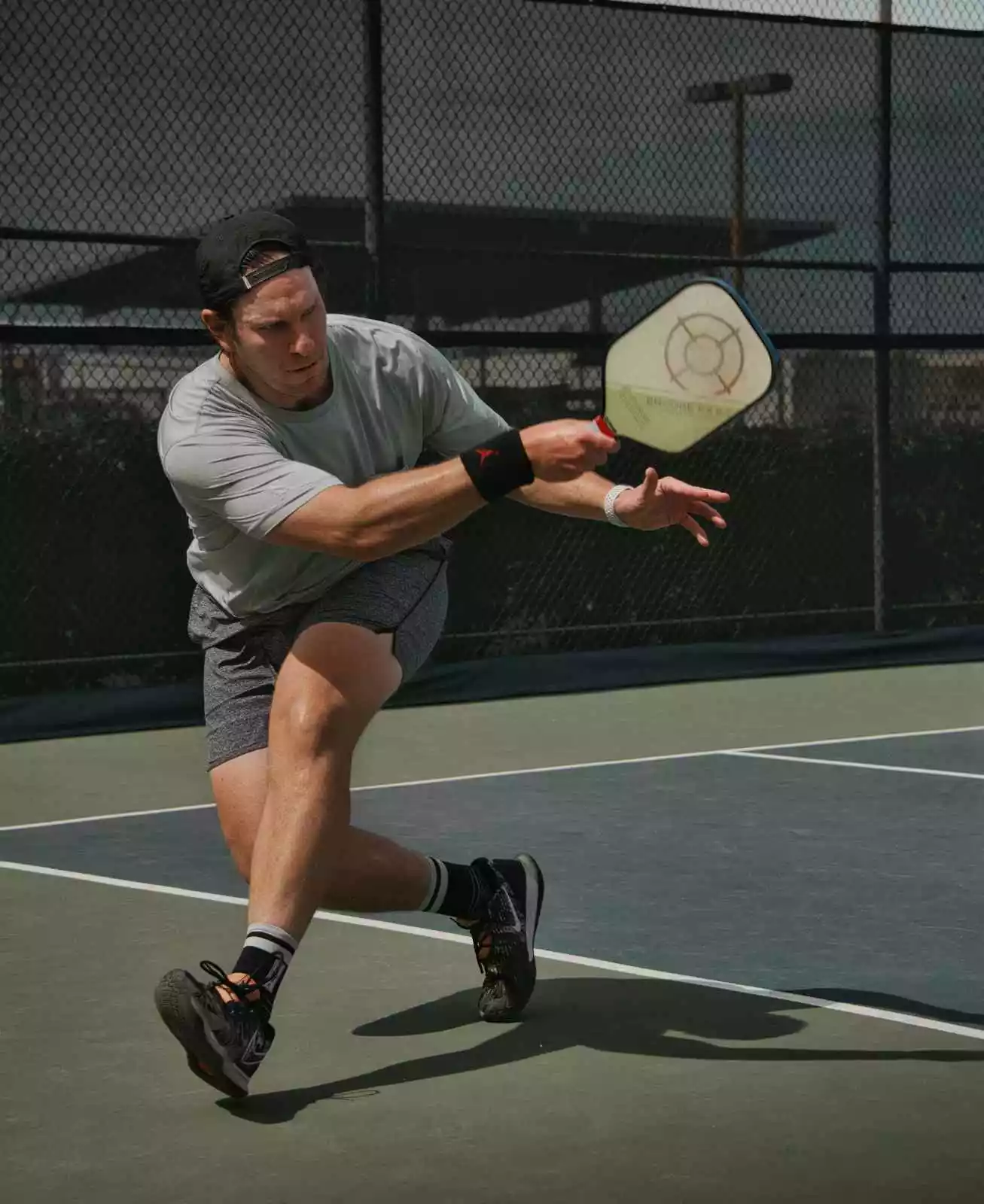
Pickleball’s more than a game to me—it’s a passion. I write, sharing its highs and lows, the thrills and the lessons. Some tales might draw you to the court, while others give a hint of the game’s magic. So, curious about my journey? Ready to dive deep into the world of pickleball with me? Let’s go.
